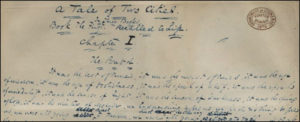
The world’s first novel was not The Handmaid’s Tale. Nor was it Tom Sawyer. No, it wasn’t Don Quixote. Generally considered to be the first was The Tale of Genji, penned by a Japanese noblewoman named Murasaki Shikibu in the early 11th century. That was 1000 years ago! It was over 400 years until the first novel in English would be published. The honorable Ms. Shikibu did her writing on a scroll and probably with a bronze stylus.
That first novel was a bit of a soap opera, telling of the many romances of aristocrat Genji during his life in the court of Japanese royalty. Not much has changed in that regard. Check Netflix or Hulu for a few minutes and you can find a similar theme from the days of yore. Twain once said, “There is no such thing as a new idea. It is impossible. We simply take a lot of old ideas and put them into a sort of mental kaleidoscope. We give them a turn and they make new and curious combinations. We keep on turning and making new combinations indefinitely; but they are the same old pieces of colored glass that have been in use through all the ages.” Still, the voices of these many writers through the centuries were unique. Twain himself was a classic example of that. Sage and sagacious, funny and wickedly acidic, lovable and detestable. His style seems fresh even today.
The great ones somewhere along the line provided pearls of wisdom that transcended their times. Geoffrey Chaucer, author of The Canterbury Tales, penned many notable quotes in Middle English. A couple we still hear are, “All good things must come to an end” and “Mercy surpasses justice.”

Authors of fiction often send their messages with subtlety not found in the brilliant treatises of Aristotle, Confucius and Voltaire. The story can make the point. Characters, in their struggles for good and evil or their search for truth versus folly, bring light and understanding to the complexities of our lives while entertaining us. My favorite writers are those who have mastered this process of conveying deeper meaning to human existence.
Obviously, there are many of these gifted wordsmiths. By using a few of them as examples, I am leaving out many who deserve to be on any short list of the greats. Nonetheless, I bravely go forth with the knowledge I slight not only them but any readers who won’t be able to believe I didn’t mention their own favorites. By no means do I suggest these are the very best authors, but their voices have indeed continued to echo down through the ages. The truth is that I haven’t even read some of the most respected writers. I present the following based on my own experience and the impact certain writers have had on my own development. In their own words, maybe you can hear their unique voices.
“I have always believed, and I still believe, that whatever good or bad fortune may come our way we can always give it meaning and transform it into something of value.”–Herman Hesse
“He smiled understandingly—much more than understandingly. It was one of those rare smiles with a quality of eternal reassurance in it, that you may come across four or five times in life. It faced–or seemed to face–the whole external world for an instant, and then concentrated on you with an irresistible prejudice in your favor. It understood you just as far as you wanted to be understood, believed in you as you would like to believe in yourself, and assured you that it had precisely the impression of you that, at your best, you hoped to convey.”–F. Scott Fitzgerald
“…and in the eyes of the people there is the failure; and in the eyes of the hungry there is a growing wrath. In the souls of the people the grapes of wrath are filling and growing heavy, growing heavy for the vintage.”–John Steinbeck
“It was the best of times, it was the worst of times, it was the age of wisdom, it was the age of foolishness, it was the epoch of belief, it was the epoch of incredulity, it was the season of Light, it was the season of Darkness, it was the spring of hope, it was the winter of despair, we had everything before us, we had nothing before us, we were all going direct to Heaven, we were all going direct the other way–in short, the period was so far like the present period, that some of its noisiest authorities insisted on its being received, for good or for evil, in the superlative degree of comparison only.”–Charles Dickens

The timeless aspect of their words demonstrate their wisdom. Remember them always.